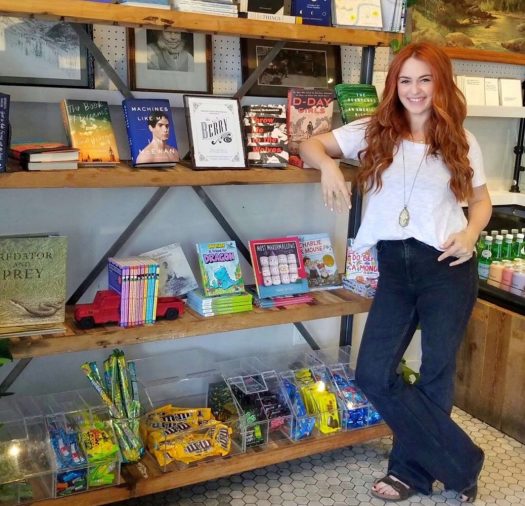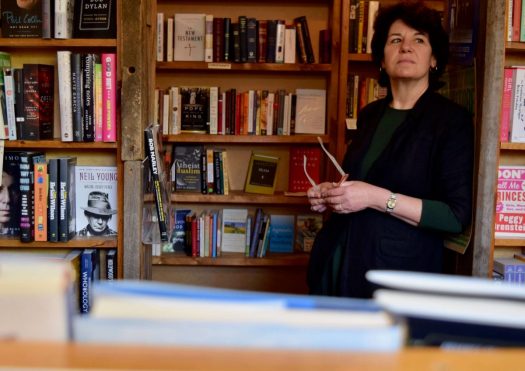Opening an independent bookstore in an age when print is supposed to be dead may seem like a risk not worth taking, but female literary lovers across the country are finding innovative ways to start this new chapter in their lives.
It just takes long hours, a lot of hard work — and a taste for dramatic irony.
“Literally my family and friends said, ‘Do not open a feminist bookstore,’” said Kalima DeSuze, owner of Cafe con Libros, which opened in 2017 in Brooklyn, New York. “Every day I find a reason to be insecure about it.”
But DeSuze echoed other business owners when she said her store provides a welcoming space for the community “that feeds our souls” — even if it is not yet turning a profit.
According to the American Booksellers Association, there has been steady growth of indie bookstores across the country, with stores operating in more than 2,500 locations in 2019 — compared with roughly 1,600 locations a decade ago.
While an ABA spokesman was not able to say how many of the group’s members are female owned, it appears there is no shortage of women getting into the book business. In New York City, Christine Onorati opened the first WORD Bookstore in 2007, Lexi Beach created The Astoria Bookshop in 2013, Emma Straub founded Books Are Magic in 2017, and Noëlle Santos established The Lit. Bar earlier this year.
[Related: An Enterprising Woman Makes Bringing Books to the Bronx Her Business]
And, perhaps more importantly, store sales are on the rise. According to the ABA, overall profits in 2018 increased by nearly 5 percent over the previous year.
“All of this is a result of the fact that indie booksellers remain a resilient and entrepreneurial group — and that independent bookstores offer a unique and unparalleled opportunity for the discovery of new authors and great writing,” said spokesman Dan Cullen.
These bookstore owners are keeping the love of reading alive through more than just the printed word, however. Sellers make daily decisions about what else might appeal to their customers and drive revenue, and they have branched out into artisanal tea and coffee, CBD and cannabis products, and even sex toys.
Socks bearing the likeness of Supreme Court Justice and feminist icon Ruth Bader Ginsburg don’t hurt, either.
To celebrate National Novel Writing Month, The Story Exchange talked to independent bookstore owners who shared stories about success, business practices, and what keeps them up late at night — when they’re not reading the latest release, of course.
The ‘Gertrude Stein’ of Sag Harbor

When Harbor Books had to leave its high-rent post on Main Street in the relaxed eastern Long Island enclave of Sag Harbor, Taylor Rose Berry immediately saw a rebranding opportunity. She found a cheaper location in May, re-dubbed the store Berry & Co., and doubled down on a new niche.
Berry still carries bestsellers, but she has expanded into what she calls “witchy stuff,” such as a tarot section, and she also started Roving Books, collections that she curates for other stores.
“I’m a book lover — that’s why I got into this,” Berry said. But, “it’s no secret that books don’t have the greatest profit margin, so that is why you will see a lot of independent bookstores branching out to different things.”
She said Dobra Tea and cannabis lifestyle products — which range from edibles to lubricant — comprise 40 percent of her business, while books and book-related merchandise make up 60 percent of overall sales.
[Related: Megan Rapinoe Joins Sister’s Cannabis Startup]
Since Sag Harbor is a seasonal community, she is thinking of starting a mobile book project and a subscription service for customers who leave for the city come fall.
Despite the high overhead costs, Berry said running a brick-and-mortar store year-round is still a big draw.
“I have a gaggle of kids I’ve watched grow up hanging out in our children’s section, and we have writers and writers’ groups that come on our porch for tea,” she said. “There’s something about that salon-esque feel. I’ve always wanted to be the Gertrude Stein of Sag Harbor.”
While she could sell wares out of her home office, Berry said she would lose something more meaningful.
“You miss the real engagement that makes books what they are,” she said. “I would miss seeing my readers and talking to them about what they were reading.”
Living eight minutes from her store, and reading eight books a week — which she then posts about on social media — has paid off for Berry. This year she anticipates 25 percent growth in sales.
“All entrepreneurs think at some point that you’re an island unto yourself,” Berry said. “But it’s a wonderful gift to be able to own your own business.”
The ‘Writer in a Candy Store’

When Nina Barrett transitioned from publishing to another kind of book business, it was at the height of the e-reader frenzy. “A lot of people thought that e-readers were going to destroy the book industry,” she said. “But that isn’t what happened.”
After receiving a master’s degree in journalism from Northwestern University, working in a feminist bookstore, and penning a few books herself — she is the author, most recently, of “The Leopold and Loeb Files” — she decided to open her shop, Bookends & Beginnings. Working at a bookshop is “like a writer working in a candy store,” she said.
The store, which recently celebrated its fifth anniversary, sits in a “very low-rent” spot in an alleyway in Evanston, Illinois, near Barrett’s alma mater. Barrett used her own money to get going, spending about $20,000 on used books to fill her rustic, wooden shelves — all of which she purchased at a discount from another store going out of business.
“It’s always been profitable,” she said. “We never borrowed money. We’ve been conservative. It has a certain rustic charm, but it was never fancy.”
Another part of the charm? “We’re not going to have any crap,” she said.
“One of the things about this business, you need to stay engaged in a day-to-day way with your community,” Barrett said. “I think of it as a conversation I’m having with my customers.”
[Related: Stacy Ratner is in Business to do Good]
She orders new releases and maintains a children’s section but doesn’t carry commercial franchise titles (such as Disney or Star Wars) to differentiate herself from her competitor, Barnes & Noble, half a block away.
“We very selectively pick,” she said. “What I’m looking for is more low-profile stuff that [customers] might not find somewhere else, and that makes browsing still a part of the bookstore experience.”
Barrett, who opened her store at age 54 after raising a family with her librarian husband, cautioned other aspiring sellers to be realistic about the industry. Right now, as a solo entrepreneur supporting three full-time and several part-time employees, she is calculating whether to move to a main street location for more visibility and foot traffic.
“A lot of people start a bookstore because they think it’s cute and quaint, and you’re going to sit around and read all day,” she said. “It’s a business, and you need to run it like a business.”
The ‘Black Feminist’ Book Lover
For Kalima DeSuze, opening a bookstore was a political act.
“Black feminism changed my life, so for me not to center my bookstore on that would be a contradiction to who I am,” she said. “I had a lot of pushback, but I think there’s something very important and transgressive about having a space specifically about women.”
DeSuze, who has an infant son and a full-time job as assistant director for field education at Hunter College to make ends meet, opened Cafe con Libros in Brooklyn in 2017.
The intimate shop and cafe features books by bell hooks, Octavia Butler, Elizabeth Acevedo and the popular science fiction writer N.K. Jemisin.
“Every story in there is about affirmation and acknowledgment of women’s roles,” she said. “It’s just different stories about women and for women.”
DeSuze and her husband took out a business loan to open the store, and she said a lot of their money goes toward overhead and paying back what they borrowed. Most of the revenue currently comes from coffee and pastries.
[Related: Kerrine Bryan: Career Themed Children’s Picture Books]
“I want it to be sustainable, I want it to thrive, but I’m not seeing profits just yet,” she said, adding that she struggles with “time, energy, and sometimes feeling uncertain about how to go about asking for mentorship. I haven’t really leveraged the community as well as I should have in terms of asking for support and ideas.”
In the meantime, DeSuze is embracing the community aspect of her small jewel in Brooklyn’s Crown Heights neighborhood. Her son makes frequent appearances, and a group of his friends come every Saturday and hang out in the children’s section.
“I want this to continue being a community-centered space where people can come together,” she said. “Of course I want to grow our revenue, and be a space where you can order coffee, books, gifts for your whole family. We hold a special place in people’s hearts.”
This article has been edited to clarify that Nina Barrett opened Bookends & Beginnings with her own savings and maintains a children’s section.

